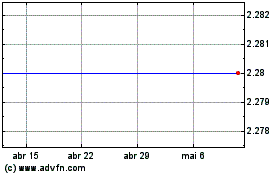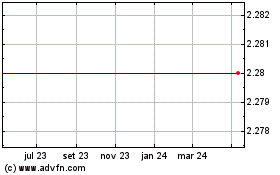resTORbio Presents Additional Phase 2b Data at the American Thoracic Society International Conference for RTB101 as a Potenti...
20 Maio 2019 - 9:00AM

resTORbio, Inc. (Nasdaq: TORC) today announced additional data from
the Phase 2b clinical trial of RTB101, an orally administered,
small molecule, potent inhibitor of target of rapamycin complex 1
(TORC1). RTB101 was well-tolerated and was observed to reduce the
incidence of respiratory tract infections (RTIs) in patients 65
years of age and older at high risk of morbidity and mortality due
to RTIs, including those with asthma. These data will be presented
today as an oral presentation at the American Thoracic Society
(ATS) International Conference (abstract #A2623) in Dallas, Texas.
“These data presented at ATS show that RTB101 may reduce the
incidence of respiratory tract infections caused by multiple
viruses, most of which lack current treatments. These findings are
particularly encouraging in efforts to prevent not only respiratory
infections in high-risk elderly asthma patients, but also the
consequences of these illnesses – asthma exacerbations,” said
William W. Busse, M.D., Professor of Medicine, Allergy, Pulmonary
and Critical Care Medicine, University of Wisconsin. “RTB101
represents a potentially important and novel step forward to
improve the treatment of patients 65 years of age and older with
asthma, and potentially reduce the risk for asthma
exacerbations.”
“Viral RTIs are one of the most common causes of asthma
exacerbations, and there is a large unmet medical need for
antiviral therapies that decrease the incidence of RTIs,
particularly in older asthmatics in whom asthma exacerbations are
associated with high rates of morbidity and mortality,” said Joan
Mannick, M.D., Co-Founder and Chief Medical Officer of resTORbio.
“Based on clinical trial findings to date, RTB101 may have the
potential to upregulate innate pan-antiviral gene expression and
thereby decrease the incidence of RTIs caused by many different
viruses in people 65 years of age and older, including asthmatics.
We look forward to progressing our PROTECTOR Phase 3 clinical
program with RTB101.”
In the U.S., asthmatics 65 years of age and older experience a
peak in asthma-related exacerbations and hospitalizations in the
winter months when the circulation of respiratory viruses also
peaks. Treatment with RTB101 10 mg once daily for 16 weeks during
winter cold and flu season was observed to:
- Reduce the percentage of patients 65 years of age and older
with asthma who developed laboratory-confirmed RTIs by 68.9% as
compared to placebo (p=0.0001).
- Reduce the percentage of patients 65 years of age and older
with asthma who developed any type of RTI (laboratory-confirmed and
not laboratory-confirmed) by 58.2% as compared to placebo
(p=0.0002).
- Reduce the rate of laboratory-confirmed RTIs in patients 65
years of age and older with asthma by 78.7% as compared to placebo
(p=0.001).
- Reduce the rate of any type of RTI (laboratory-confirmed and
not laboratory-confirmed) in patients aged 65 and older with asthma
by 66.4% as compared to placebo (p=0.003).
- Reduce the incidence of RTIs caused by multiple different
viruses in patients 65 years of age and older with asthma.
- RTB101 10 mg once daily was observed to be well-tolerated.
Adverse events were balanced between the RTB101 10 mg once daily
and placebo treatment arm.
About Respiratory Tract Infections (RTIs) in the
ElderlyAs part of the aging process, the immune system
weakens and becomes less effective at detecting and fighting
infections such as RTIs. As a result, RTIs are more likely to be of
greater severity, prolonged duration, and are more likely to be
associated with medical complications in people 65 years of age and
older compared to younger adults. In the U.S., RTIs are the fourth
leading cause of hospitalization and seventh leading cause of death
in people 65 years of age and older. Given that RTIs are caused by
many different types of viruses, most of which lack effective
therapies, there remains a significant unmet medical need for an
immunotherapy that enhances the ability of the immune system to
fight multiple viruses to reduce illness associated with RTIs in
the elderly.
About RTB101RTB101 is an oral, selective, and
potent TORC1 inhibitor product candidate. TORC1 inhibition has been
shown to be of therapeutic benefit in multiple aging-related
conditions in preclinical species including immunosenescence
(aging-related decline in immune function). In two Phase 2 clinical
trials enrolling over 900 elderly people, RTB101 was observed to
improve immune function by upregulation of antiviral gene
expression and to reduce the incidence of RTIs.
About resTORbioresTORbio, Inc. is a
clinical-stage biopharmaceutical company developing innovative
medicines that target the biology of aging to prevent or treat
aging-related diseases. resTORbio’s lead program selectively
inhibits TORC1, an evolutionarily conserved pathway that
contributes to the decline in function of multiple organ systems,
including the immune, cardiovascular and central nervous systems.
Learn more about resTORbio, Inc. at www.resTORbio.com.
Forward Looking StatementsThis press release
contains forward-looking statements within the meaning of the
Private Securities Litigation Reform Act of 1995, as amended.
Investors are cautioned that statements in this press release which
are not strictly historical statements, including, without
limitation, express or implied statements or guidance regarding our
future plans to develop RTB101 alone or in combination with
rapalogs, such as everolimus or sirolimus, including the
therapeutic potential and clinical benefits thereof and the
potential patient populations that may be addressed by our product
candidates, our ongoing and future clinical trials for RTB101,
including the timing of the initiation and anticipated results of
these trials, the intended regulatory path for our product
candidates and interactions with regulatory authorities, and our
ability to replicate results achieved in our clinical trials in any
future trials, constitute forward-looking statements identified by
words like “believe,” “expect,” “may,” “will,” “should,” “seek,”
“anticipate,” or “could” and similar expressions.
Such forward-looking statements are subject to a number of risks
and uncertainties that could cause actual results to differ
materially from those anticipated, including, without limitation,
risks associated with: our planned Phase 3 clinical trials in RTIs
and/or development of RTB101, either alone or in combination with a
rapalog, such as everolimus or sirolimus; our ability to
successfully demonstrate the efficacy and safety of our lead
product candidate; the clinical results for our lead product
candidate which may not support further development of additional
indications; uncertainties related to the results of our clinical
trials predictive of future results in connection with future
trials, including our Phase 3 clinical trials; the timing and
outcome of our planned interactions with regulatory authorities;
and obtaining, maintaining and protecting our intellectual
property; as well as those risks more fully discussed in the
section entitled “Risk Factors” in the Annual Report on Form 10-K
filed by resTORbio, Inc. with the Securities and Exchange
Commission, as well as discussions of potential risks,
uncertainties, and other important factors in our subsequent
filings with the Securities and Exchange Commission. In
addition, any forward-looking statements represent our views only
as of today and should not be relied upon as representing its views
as of any subsequent date. resTORbio explicitly disclaims any
obligation to update any forward-looking statements.
Investor Contact Michael SchaffzinStern
Investor Relations,
Inc.212-362-1200michael.schaffzin@sternir.com
Media ContactEllen MurphyBiosector
2212-849-9496Ellen.Murphy@syneoshealth.com
resTORbio (NASDAQ:TORC)
Gráfico Histórico do Ativo
De Mar 2024 até Abr 2024

resTORbio (NASDAQ:TORC)
Gráfico Histórico do Ativo
De Abr 2023 até Abr 2024
